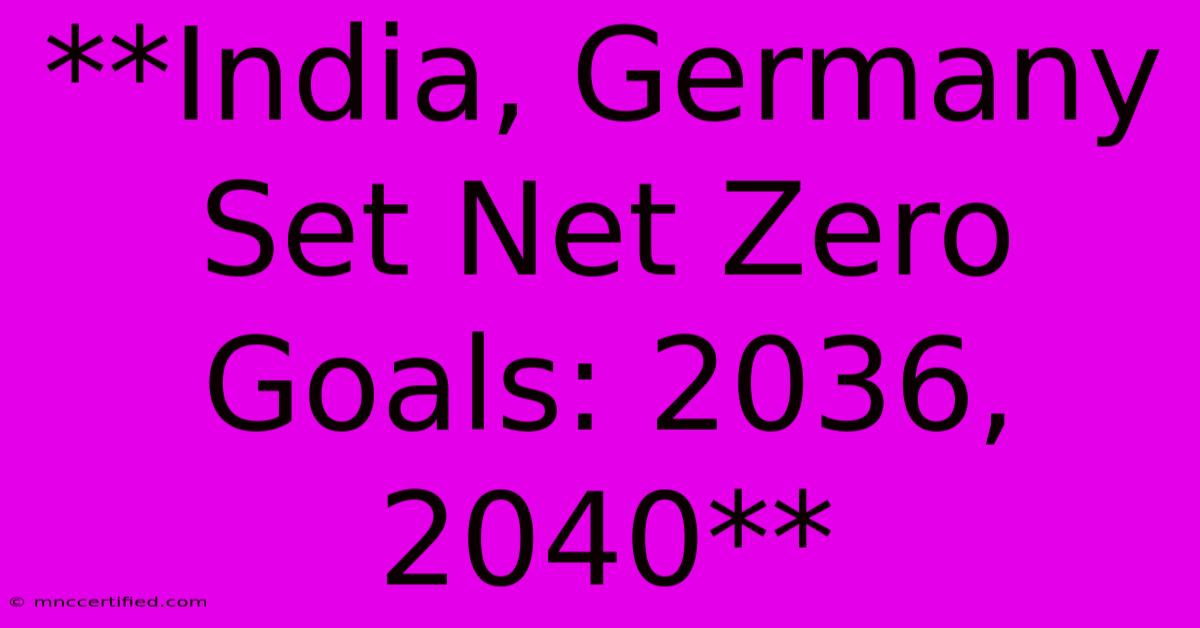**India, Germany Set Net Zero Goals: 2036, 2040**

Table of Contents
India, Germany Set Net Zero Goals: 2036, 2040 - A Race Towards a Sustainable Future
The global climate crisis is a pressing issue demanding urgent action. Two major players, India and Germany, have taken bold steps by setting ambitious net-zero emission targets, signaling a commitment to a sustainable future.
India's Net Zero Ambition: Aiming for 2070
India, a nation with a rapidly developing economy and a significant population, announced its net-zero target for 2070 at the COP26 summit in Glasgow. This ambitious goal, outlined in the Panchamrit pledge, also includes a pledge to reduce its emissions intensity by 45% by 2030.
Key Factors Driving India's Net Zero Goal:
- Growing Concerns about Climate Change: India is increasingly experiencing the adverse effects of climate change, including extreme weather events and rising sea levels.
- Transitioning to a Green Economy: India aims to utilize its vast renewable energy potential and promote sustainable development, fostering economic growth while mitigating climate impact.
- Global Leadership and Collaboration: By setting a clear target, India demonstrates leadership in the global fight against climate change and encourages international collaboration towards achieving net-zero goals.
Germany's Net Zero Target: Aiming for 2045
Germany, a leading industrial nation with a strong environmental consciousness, has set a net-zero target for 2045. This goal is part of a comprehensive climate action plan aimed at achieving a carbon-neutral economy.
Key Pillars of Germany's Net Zero Strategy:
- Accelerating Renewable Energy Deployment: Germany is aggressively investing in renewable energy sources like solar, wind, and hydropower to replace fossil fuels.
- Energy Efficiency and Conservation: Prioritizing energy efficiency measures in buildings, industries, and transportation sectors.
- Technological Innovation: Investing in research and development of green technologies like carbon capture and storage (CCS) and hydrogen production.
- Phasing Out Coal: Germany is committed to gradually phasing out coal-fired power plants, replacing them with renewable energy sources.
Challenges and Opportunities:
India's path to net-zero:
- Balancing Economic Development with Environmental Sustainability: India faces the challenge of ensuring economic growth while reducing emissions, requiring significant investment in clean technologies and infrastructure.
- Energy Access and Affordability: Ensuring access to clean and affordable energy for all citizens is crucial for achieving a just transition.
- Technological Advancement: India needs to accelerate the development and deployment of renewable energy technologies and green infrastructure.
Germany's path to net-zero:
- High Costs of Transition: Moving away from fossil fuels necessitates substantial investments in renewable energy and infrastructure, which may impact businesses and consumers.
- Ensuring Social Equity: The transition to a net-zero economy must be fair and inclusive, addressing potential job losses and ensuring equitable access to clean energy.
- International Cooperation: Global collaboration is essential to achieve the ambitious net-zero targets, requiring shared knowledge, technology transfer, and financial assistance.
Conclusion:
India and Germany's commitment to achieving net-zero emissions by 2070 and 2045, respectively, sends a powerful message about the urgency of climate action. While both countries face significant challenges in their respective journeys, these bold targets pave the way for a future where economic prosperity is intertwined with environmental sustainability. The world watches as these two nations strive towards a cleaner, greener future, offering hope and inspiration for a sustainable world for generations to come.

Thank you for visiting our website wich cover about **India, Germany Set Net Zero Goals: 2036, 2040**. We hope the information provided has been useful to you. Feel free to contact us if you have any questions or need further assistance. See you next time and dont miss to bookmark.
Featured Posts
-
Rosenbaum And Pearl Investment Banking
Nov 09, 2024
-
Duluth Trading Company Womens Jackets
Nov 09, 2024
-
Springboks All Blacks Ireland Rugbys Top Spot Race
Nov 09, 2024
-
Lakers Vs 76ers Game Time And Tv
Nov 09, 2024
-
Pediatrician Visit Cost With Insurance
Nov 09, 2024